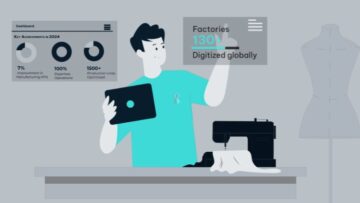The fashion industry is undergoing a massive churn as businesses realign to survive in a tariff war era. The battle to lead tomorrow’s fashion landscape has already begun and the winners will be those who embrace tech, data and intelligent systems, right now.
“Those who still treat tech as an afterthought are already falling behind,” stated Rishi Kapoor, National Sales Head – India, Avery Dennison, a global leader in materials science and digital identification solutions.
In an off-the-cuff chat with Apparel Resources, Rishi highlighted how they are bringing the physical and digital worlds together with innovative solutions for the apparel industry. Here are the edited excerpts:
AR: Traceability is becoming super important in fashion—what are you doing to promote it?
Rishi Kapoor: Traceability is no longer a nice-to-have… it’s become essential for building trust, meeting compliance and driving real progress in sustainability. Keeping pace with this shift, we developed our portfolio of solutions to deliver end-to-end traceability across the supply chain.
It’s already managing over 28 billion items for brands across fashion, retail, food and healthcare. Optica was built as a portfolio made up of a series of configuration solutions. All solutions combine Avery Dennison’s smart labels and atma.io connected product cloud with in-field hardware and technical support and provide visibility via an online dashboard. This level of insight gives brands and factories the information and awareness they need to take proactive action and make informed decisions.
For example, brands are struggling with downstream visibility, especially with fast-changing regulations and increasing pressure to improve productivity. Meanwhile, manufacturers are under pressure to offer this kind of transparency but don’t always have the tools. Optica tackles this head-on, offering item-level visibility that helps optimise operations, improve order accuracy, reduce losses and strengthen supply chain relationships.
We’ve got a few key solutions that help make this happen. One is Materials Traceability, which captures raw material attributes at the item level—creating a verifiable chain of custody as materials move through the supply chain. That means brands can track and trace the origin of inputs, validate compliance documents and meet regulatory needs with confidence. Another big one is Work-in-Progress (WIP) Tracking, which follows materials through every production stage. It’s not just about visibility, it’s about optimisation. By capturing real-time data from the factory floor, factories can spot delays, allocate resources better and manage orders more efficiently—from cutting to final shipment. Then there’s Packing Verification, a solution that’s become crucial in today’s competitive landscape. Mistakes like wrong or missing labels, incorrect shipments or last-minute reworks can lead to expensive chargebacks for factories. Our solution helps eliminate these by validating items against the packing plan in real time using RFID. All scan data is synced to the atma.io platform and visualised on the factory dashboard, giving brands and suppliers a final traceability checkpoint before goods leave the factory.
We’ve also seen a big impact on warehousing. Before RFID, it took hours—or even days—to track inventory across large warehouses. Now, our partners are checking inventory multiple times a day in real time, which makes the whole operation far more agile and responsive.
AR: How are you making factories more self-sufficient with labelling?
Rishi Kapoor: We understand the growing need for speed and flexibility in today’s supply chain, that’s why we’ve introduced ‘On-demand Labelling’.
We’re offering factories the flexibility of a blended solution that offers trims, labels and RFID tags as well as speed of on-demand labelling.
With on-demand labelling, we can help you print care labels, price tags or barcode stickers on-demand—no minimum orders, no long waits. You can respond to last-minute changes, reduce waste and avoid dead stock. We provide everything: the printers, the software, the supplies and full support—including installation and training.
We have a reliable and easy-to-use printer, ADTP1TM, which handles variable data with precision. It connects seamlessly with our software and support network, making it ideal for everything from compliance labelling to warehousing. For example, if you’re working with some big retailers, our system integrates directly with their servers. The factory can print custom RFID tags instantly, even if it’s just one piece.
The best part? We don’t ask factories to buy the equipment. We sign a 3- to 4-year partnership, take care of the machinery investment and the factory just needs a desktop and an operator. There’s no CapEx involved. They simply pay for consumables, like they would for regular materials—say Rs. 5 or 50 cents per piece. It’s efficient, cost-effective and completely scalable.
The agreement is volume-based. So depending on what we agree, two million pieces, 10 million, whatever fits the need, we commit to delivering the full solution.
AR: How is the mindset shifting in India for RFID and labelling? Is it still seen as a cost or now as a tool for efficiency and growth?
Rishi Kapoor: India is in a unique position when it comes to adopting technologies like AI tools and RFID. The journey only began a few years ago, and right now, we’re in the demand creation stage.
Initially, many companies viewed these technologies purely from a cost perspective. But now, the conversation is shifting towards value creation—and we’re seeing that mindset evolve in real time.
| “Technologies such as RFID for item tracking help companies create a reliable data foundation. This will be essential for keeping up with fast-changing sustainability regulations and improving efficiency across the board. Right now though, many fashion brands and retailers are finding it tough and costly to deliver the level of transparency that’s becoming increasingly mission-critical.” |
Brands are increasingly evaluating both Capex, like installing antennas in stores, and Opex, which covers ongoing software, maintenance and support.
Our approach is to make this transition easier by demonstrating clear, tangible benefits, whether that’s accurate inventory tracking, real-time sales visibility or deeper insights into store-level performance.
Take the instance of a leading fast fashion retailer in India that partnered with us.
They initially struggled with limited visibility into their warehousing operations. By integrating RFID, we helped them solve that challenge. Now they’ve entered the second phase—rolling out RFID benefits to their stores, enabling real-time inventory tracking and faster customer service.
The warehouse-focused phase is nearly complete, the store-level implementation is already live and we’re now working with them on the third phase, which will address returns management.







